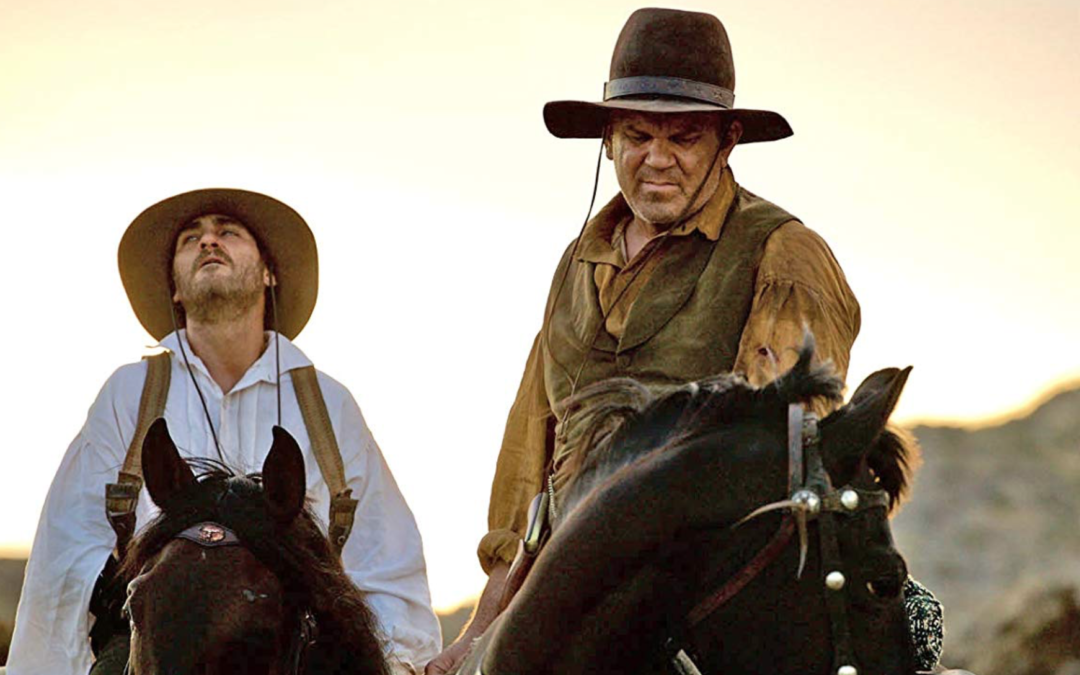The critical class is going to love The Sisters Brothers. Its pedigree demands it: the Western stars Joachim Phoenix, who has developed into one of the best actors of his generation and the always-irresistible John C. Reilly. Its director is Jacques Audiard, the Palme D’Or-winning (Dheepan) French mainstay and creator of tough-minded, naturalist crime dramas (A Prophet) making his first English-language film. That Audiard is choosing to tackle that most American of genres, the Western, is enough to make one salivate. What does Audiard see in the Western that he can subvert? What does he make of its character archetypes, visual signifiers and typical story concerns?
On the whole, his rambling answer is not as revelatory as any random scene from revisionist Westerns like Robert Altman’s McCabe and Mrs. Miller or Clint Eastwood’s Unforgiven. But its denouncement of the American obsession with money and the Gold Rush-motivated explosion of unbridled capitalism is something any French director would be eager to explore, assuming he or she isn’t vacationing the entire month of August, enjoying one of France’s 30 holidays per year or suing their employer for illegally emailing them after work hours.
If Audiard comes from the land of work-life balance, in The Sisters Brothers he tells the story of two siblings whose only pursuits in life seem to be drinking, sleeping around and killing people for money. The year is 1851, the place is Oregon and Charlie and Eli Sisters are hired hitmen for a mustachioed big wig named The Commodore (played by Rutger Hauer in a big wig). Their latest assignment is to kill a chemist named Hermann Kermit Warm (Riz Ahmed), who has invented a formula that will make the backbreaking work of gold prospecting as easy as plucking pebbles from a stream. Their advance man is John Morris (Jake Gyllenhaal), tasked with detaining Warm until the brothers can torture the formula out of him and then kill him.
While all that seems straightforward enough, Audiard is not interested in a straightforward story any more than Canadian author Patrick DeWitt, who wrote the very fine, darkly comic 2011 novel upon which this film is based. The centerpiece, unsurprisingly, is the relationship between Eli (Reilly) and Charlie (Phoenix), one that remains authentically, stubbornly, volatile and opaque. Eli is the more probing and sensitive brother with dreams of leaving the assassination business. Charlie loves the drinking, whoring and killing their itinerate lifestyle affords and he relishes the Commodore promoting him to lead man in their pursuit of Warm. Their reputation as merciless killers precedes them, something that provides Charlie no shortage of pride.
As the antihero brothers, Phoenix and Reilly don’t look much alike but they compliment each other well. Phoenix plays Charlie as angry, coldblooded, damaged goods who lives on the run not because he likes it, but because he’s trying to stay one step ahead of the tragic past he and Eli share. Reilly’s role is less showy but tougher. The yearning, melancholy themes of The Sisters Brothers, novel and film, are burdens Eli must carry and Reilly is sensational, giving us a smooth arc as he plays both ends of the power dynamic between the two brothers. It’s no coincidence that Eli’s the one who relishes that brand new invention, the toothbrush (cleanse your mouth, cleanse your soul), or the first, upon arriving in San Francisco (or “Babylon”, as Charlie calls it) to marvel at the indoor toilet. The barbarism of the Old West is getting phased out, something Eli embraces, while Charlie is too enamored of the killing and the whoring to care.
In rewarding contrast to Charlie and Eli are Hermann and John. Hermann is the idealist, both too smart for his own good and not smart enough, the one fated to learn that the concept of “get rich quick” is one of America’s founding delusions. And yet, as someone willing to share his invention with John, he’s as close as the film gets to a hero. Ahmed gives Warm surprisingly soft contours that work well against John, a pretentious dandy who quotes Thoreau, yet is not so high-and-mighty he can’t ditch his original assignment and join up with Hermann to profit off his formula.
So the ingredients are there and yet, after its first episodic hour, I found myself struggling against a growing disappointment as I wondered if Audiard was going to take us anywhere particularly adventuresome or truly new. It’s easy to imagine this story being told perfectly well using the established syntax of the Western, something Audiard presumably and justifiably wanted to avoid. Yet his muscular visual approach, which has yielded plenty of rewards in his other films, shows some flab. This Old West picaresque does bounce along with some pleasingly odd rhythms (helped along by Alexandre Desplat’s offbeat score), but too often the serio-comic meandering becomes too shambolic, going beyond a representation of the tedious, untidy, quotidian nature of the brothers and their work. He does stage more than one gunfight in striking long shot, muzzle flashes lighting up the night in death-bringing orange. And this is definitely a handsome picture, the key contributors being costume designer Milena Canonero and production designer Michel Barthélémy.
By its conclusion, one gets the feeling that, to Audiard, The Sisters Brothers being a Western is incidental. The 66-year old director, who dedicates the film to his own brother, might have been motivated to explore the bond between siblings. If so, he makes it across the finish line only by virtue of effectively exploiting an environment alien to him as a director and a French national to make his points about the mercurial, love/hate, power shifting nature of such relationships. As someone without siblings, I latched onto the film’s other takeaway: give up your guns and your pursuit of money and even an American can have a happy ending.

